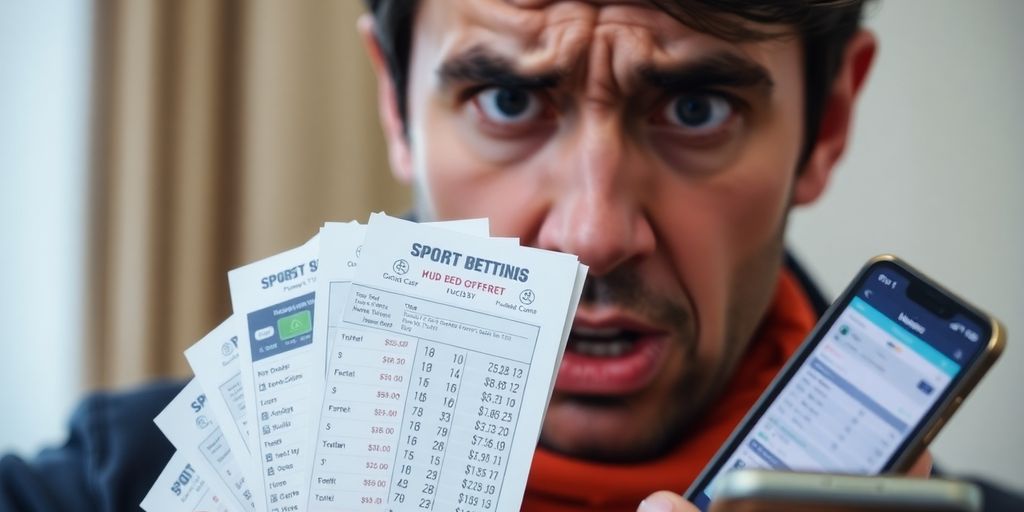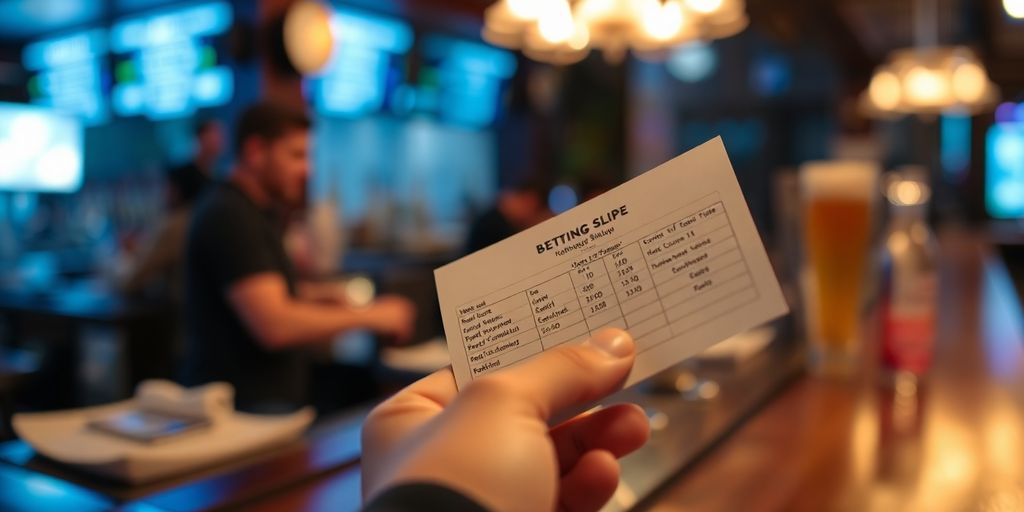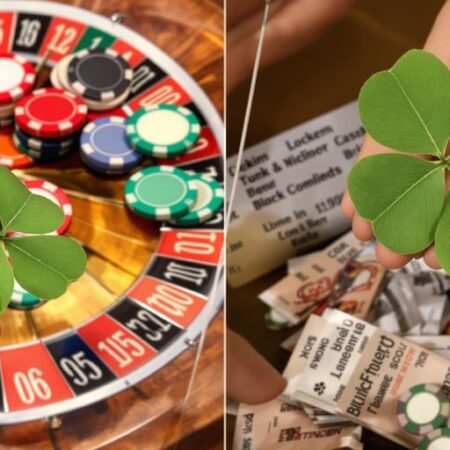Getting into sports betting can be exciting, but it’s easy to make some common mistakes that can cost you money. Many beginners jump in without a solid plan, thinking it’s all about luck. But really, it’s more about being smart and prepared. We’re going to look at some of the most common mistakes sports betting participants make so you can avoid them and hopefully have a better experience.
Key Takeaways
- Always set a budget for your betting and stick to it. Treat it like any other entertainment expense.
- Do your homework before placing a bet. Look at team stats, player injuries, and recent performance.
- Don’t let your emotions, like rooting for your favorite team, cloud your judgment when betting.
- Shop around for the best odds across different sportsbooks to maximize your potential winnings.
- Avoid chasing losses; if you have a bad run, take a break and reassess instead of betting more impulsively.
Not Having A Budget
Look, nobody wants to think about limits when they’re excited about placing a bet. It’s way more fun to imagine hitting that big payout. But here’s the deal: if you don’t set a budget, you’re basically just throwing money away. It’s like going to the grocery store without a list and just grabbing whatever looks good. You end up with a cart full of stuff you don’t need and a bill that makes your eyes water. Sports betting is no different. You need to decide beforehand how much you’re willing to spend, and then you absolutely have to stick to it. This isn’t just about not going broke; it’s about staying in the game. If you blow through your betting money in a week, you miss out on all the other games. Your budget is your lifeline.
Think about it like this:
- Total Betting Fund: This is the total amount you’ve set aside for betting over a specific period, say, a month. Never use money you need for rent or bills. Seriously.
- Per-Bet Limit: A good rule of thumb is to never bet more than 1-2% of your total betting fund on a single wager. So, if your monthly fund is $200, one bet shouldn’t be more than $2 to $4. It sounds small, but it protects you.
- Daily/Weekly Cap: Set a limit for how much you can spend in a day or week, even if you haven’t hit your per-bet limit. This stops you from getting carried away.
Without a budget, it’s easy to get caught up in the excitement and make impulsive decisions. You might chase a loss or bet more than you intended because you feel a ‘sure thing.’ That’s a fast track to regret. Having a budget gives you control. It lets you enjoy the action without the financial stress. It’s not about limiting your fun; it’s about making sure the fun can continue.
Not Doing Enough Research
Look, nobody wants to lose money, right? But jumping into sports betting without doing your homework is like walking into a casino blindfolded. You wouldn’t do that, would you? So why bet on a game without knowing anything about it? It’s a recipe for disaster, plain and simple.
You absolutely need to understand the teams, the players, and the context of the game. This isn’t just about knowing who’s playing. It’s about digging deeper. What’s a team’s recent form? Are key players injured or suspended? How do these two teams match up historically? What about home-field advantage or travel fatigue? These details matter. A lot.
Here’s a quick rundown of what to look into:
- Team Performance: Check recent game results, offensive and defensive stats, and how they perform against similar opponents.
- Player Status: Injuries, suspensions, or even personal issues can significantly impact a player’s performance, and by extension, the team’s chances.
- Matchup Specifics: Consider head-to-head records, coaching strategies, and any specific tactical advantages or disadvantages.
- External Factors: Weather conditions, venue, and even the referee or umpire can sometimes play a role.
Ignoring this stuff is just asking to get burned. It’s not about being a super-fan; it’s about being smart with your money. You wouldn’t invest in a company without looking at its financials, so don’t bet on a game without looking at the stats. It’s that basic.
Making Emotional Bets
Betting with your heart is a classic mistake, and honestly, it’s so easy to fall into. You see your favorite team playing, maybe they’re even a slight underdog, and suddenly you just know they’re going to pull off a win. It doesn’t matter what the stats say or who the opponent is; your gut feeling, fueled by loyalty, tells you to place that bet. This is where things get dicey.
Emotional betting clouds judgment, turning what should be a calculated decision into a gamble based on feelings. It’s like trying to fix a leaky faucet when you’re really angry – you’re probably going to make it worse. You might bet more than you intended, or pick a side you haven’t properly researched, just because you want them to win.
Think about it:
- Team Loyalty: You love Team A. They’re playing Team B. Even if Team B has a better record and is favored, you might still bet on Team A out of pure devotion.
- Rivalry Games: A grudge match against a hated rival can make you bet with your head, not your head. You might overvalue your team’s chances simply because you despise the opponent.
- Recent Performance Bias: Your team just had a huge win, so you assume they’ll keep that momentum going, ignoring that the next opponent is significantly tougher.
It’s totally fine to have favorite teams, of course. But when it comes to placing a wager, you’ve got to put that personal connection aside. Look at the numbers, check the matchups, and make a choice based on what the data suggests, not just who you’re cheering for. If you find yourself getting too worked up about a particular game or team, it’s probably a good sign to step away for a bit. Let the emotions cool down before you put any money down.
Not Shopping For Odds
You know, it’s easy to just stick with the first place you find to place a bet. Maybe it’s the one you always use, or the one that’s easiest to get to. But seriously, that’s like buying a car without checking other dealerships. You wouldn’t do that, right? So why do it with your bets? Different sportsbooks, they all have their own prices, their own odds. Sometimes, these differences are small, like a few cents. But over time, those small differences add up. It’s like finding a dollar on the sidewalk every day. It doesn’t seem like much, but after a year, that’s a lot of dollars.
Think about it. You want to bet on a specific team to win. One place might offer them at +100, meaning you get your money back plus an equal amount. Another place might offer them at +110. That’s an extra ten percent for the same bet! It’s not hard to check. You don’t need to be a math whiz or anything. Just a quick look around online before you put your money down. Always take a few minutes to see who’s giving you the best deal. It’s your money, after all. Don’t leave free money on the table. It’s a simple step, but it makes a real difference in your winnings. Seriously, it’s a no-brainer.
Betting On Trends
Following trends can feel like a shortcut to winning bets, but it’s often a trap. Think about it: if a team is on a hot streak, sportsbooks know it too. They’ll adjust their odds, making that team less appealing to bet on. Betting just because a team has won a few games in a row is like buying a stock because its price went up yesterday. It doesn’t tell you much about tomorrow.
Sure, trends exist. Teams do go on runs. But relying on them alone is a weak strategy. What about injuries? Coaching changes? A sudden tough schedule? These things matter way more than a recent win total. You need to dig deeper.
Here’s a better way to think about it:
- Look beyond the surface. A team might be winning, but are they covering the spread? Are their wins against weak opponents?
- Consider the ‘why’. Why is the team winning? Is it a solid game plan, or just luck?
- Check the odds movement. If odds are moving sharply, it might be sharp money, or it might be public money chasing a trend. You gotta figure out which.
Don’t just bet the trend; understand the trend. If you see a trend that looks good, do your homework. Does the data actually support it, or are you just going with the crowd? Betting with the crowd is rarely where the real value is found. It’s easy to get caught up in the hype, but that’s how you lose money.
Setting Unrealistic Expectations
Look, nobody gets into sports betting thinking they’re going to lose money. We all dream of hitting that big parlay or consistently picking winners. But let’s be real, expecting to get rich quick is a fast track to disappointment, and frankly, a good way to blow through your betting money before you even get a feel for things. It’s like thinking you’ll become a pro athlete overnight. It just doesn’t work that way.
Many folks start out thinking they can win a certain amount each week, or that they’ll always pick the right side. This often comes from not really understanding how much luck and variance are involved. Sports are unpredictable. Even the best teams have off days, and upsets happen all the time. You might have a great run for a few days, but then hit a wall. That’s normal.
Here’s the deal:
- Betting is a marathon, not a sprint. You’re not going to win every bet. You’re not even going to win most of them if you’re being honest with yourself. The goal is to be profitable over the long haul, not to get rich in a week.
- Understand the odds. The odds are set by bookmakers for a reason. They reflect probabilities, but also the bookmaker’s need to make money. You won’t always be right, and that’s okay.
- Focus on process, not just outcomes. Did you do your research? Did you stick to your budget? If you did those things, even a losing bet is part of a sound strategy. Don’t let one bad result ruin your whole approach.
Trying to win big on every single bet is a recipe for disaster. It leads to bigger bets, chasing losses, and generally poor decision-making. Keep your expectations grounded. Celebrate small wins, learn from losses, and remember that consistent, smart betting is the way to go. Seriously, don’t expect to be a millionaire by next Tuesday.
Chasing Losses
Losing is part of the game, plain and simple. Everyone loses bets, even the pros. The real danger comes when you let those losses get to you, making you want to win it all back right now. This is called chasing losses, and it’s a fast track to blowing through your bankroll. You might think, ‘Just one more bet, a bigger one, and I’ll be even.’ But that’s a trap. Often, that next bet is a rushed, poorly thought-out decision, and guess what? You lose again. Now you’re in a deeper hole, feeling even more desperate. It’s a vicious cycle. The best way to avoid chasing losses is to accept that they happen and stick to your original betting plan. There’s always another game tomorrow, another opportunity. Don’t let a bad beat push you into making even worse decisions. Take a breath, regroup, and wait for a bet you’ve actually researched and feel confident about, not one driven by panic.
Betting Under The Influence
Look, we all like to unwind with a drink now and then, right? It’s just part of life. But when it comes to placing bets, that’s where you gotta draw the line. Seriously, mixing alcohol and sports betting is a recipe for some really bad decisions. Your judgment gets fuzzy, and suddenly that long shot bet on a team you know nothing about seems like a brilliant idea. It’s way too easy to blow through your bankroll when your inhibitions are lowered. Never place a bet if you’ve been drinking. It’s just not worth the risk. Keep the celebrations for after the game, and only after you’ve won with clear thinking. You wouldn’t drive a car after a few drinks, so don’t bet like you’re invincible either. It’s a slippery slope, and one that can lead to some serious regret.
Avoiding Strategy
Look, betting without a plan is like trying to cook without a recipe. You might get lucky and make something edible, but more often than not, it’s going to be a mess. Many folks just jump in, throwing money down based on a hunch or because their buddy said so. That’s not a strategy; that’s just hoping for the best, and hope doesn’t pay the bills. You need a system, something that guides your decisions. Think about it: what’s your approach to picking games? Do you look at stats? Player matchups? Coaching tendencies? Maybe you focus on specific leagues or types of bets. Whatever it is, you gotta have something concrete. Without a strategy, you’re basically just gambling, not betting. It’s a big difference, and it’s the difference between losing money and potentially making it. You wouldn’t build a house without blueprints, right? So why bet without a strategy? It’s just not smart.
Here’s a basic breakdown of what a strategy might include:
- Bankroll Management: How much money are you willing to risk on each bet? A common rule is to never bet more than 1-2% of your total bankroll on a single event.
- Research Process: What information do you need to gather before placing a bet? This could be team form, injury reports, head-to-head records, or even weather conditions.
- Bet Selection Criteria: What makes you decide to bet on one outcome over another? Is it value, a specific statistical edge, or something else?
- Record Keeping: Track every bet you make. What did you bet on, what were the odds, what was the outcome, and why did you make that bet? This is super important for learning.
Focusing Only On Big Events
It’s easy to get caught up in the hype of the Super Bowl or the World Series. Everyone’s talking about them, the ads are everywhere, and the potential payouts seem huge. But focusing only on these massive events is a common pitfall for many bettors. You’re essentially putting all your eggs in one very crowded basket.
Think about it: these big games have tons of public money on them. This means the odds might not be as favorable as they could be elsewhere. Plus, with so many people betting, it’s harder to find an edge.
What you might be missing are the smaller leagues and less-hyped matchups. These can be goldmines if you’re willing to put in the work.
Here’s why you should look beyond the marquee events:
- Less Public Scrutiny: Smaller events often fly under the radar. This means fewer people are betting, and the odds might not be as sharp. You can find value if you do your homework.
- Opportunity for Research: It’s easier to become an expert in a niche league than in every major sport. Dedicate time to understanding a specific league or even a few teams within it. You’ll know their strengths, weaknesses, and recent form better than the average bettor.
- Better Odds: Because the public isn’t focused here, sportsbooks might offer more generous odds to attract action. This is where smart money can often be found.
Don’t let the bright lights of the major events blind you to the opportunities hiding in plain sight. It takes discipline, but exploring these less-traveled paths can really pay off. You might find yourself rooting for the underdog in a league you barely knew existed, and actually winning money doing it.
Wrapping It Up: Betting Smarter, Not Harder
So there you have it. Betting on sports can be a lot of fun, and maybe even a little profitable, if you play it smart. We’ve gone over some of the biggest slip-ups people make, like betting with your gut instead of your brain, not setting aside a clear budget, or just not doing your homework before placing a bet. It’s easy to get caught up in the excitement, but remembering these points can really make a difference. Think of it like this: avoiding these common mistakes is like having a good coach. It helps you stay on track and actually enjoy the game without the added stress of losing money you can’t afford to lose. Keep these tips in mind, and you’ll be well on your way to a more enjoyable and potentially successful betting experience.
Frequently Asked Questions
Why is it important to set a budget for sports betting?
Think of your betting money like a special allowance. Decide how much you can spend each week or month and stick to it. It’s best to use money you don’t need for important things like rent or food. Setting up a separate account just for betting can help you keep track and stay within your limits.
What kind of research should I do before placing a bet?
Before you bet, learn about the teams and players. Look at how they’ve played recently, if anyone is injured, and what experts are saying. This helps you make smarter choices instead of just guessing.
How can I avoid making bets based on emotions?
It’s easy to bet on your favorite team, but that can lead to losing money. Try to be fair and look at the facts and stats for all teams. Betting with your head, not just your heart, is key to success.
Why should I compare odds from different sportsbooks?
Different betting sites offer different odds, which are like the prices for your bets. Always check a few sites to find the best odds. Even small differences can add up to more winnings over time.
Is it a good idea to bet based on winning streaks or trends?
Just because a team has been winning a lot doesn’t mean they always will. Trends can be misleading. It’s better to do your own research and not just follow what everyone else is doing.
What are realistic expectations for sports betting?
Don’t expect to get rich quick. Sports betting is usually about small wins over time. Focus on making smart, steady bets rather than trying to win a lot of money all at once. This helps you play longer and have more fun.
What should I do if I start losing bets?
If you lose a bet, don’t try to win it all back by betting more money than you planned. This often leads to bigger losses. If you’re on a losing streak, it’s okay to take a break and re-evaluate your strategy.
Why is it important to avoid betting when under the influence or feeling emotional?
Betting while you’re drinking or feeling upset can lead to bad decisions. Alcohol and strong emotions can make you spend more money than you intend or make risky bets. It’s best to bet when you’re clear-headed and calm.
















